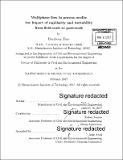Multiphase flow in porous media: the impact of capillarity and wettability from field-scale to pore-scale
Author(s)
Zhao, Benzhong
DownloadFull printable version (13.42Mb)
Other Contributors
Massachusetts Institute of Technology. Department of Civil and Environmental Engineering.
Advisor
Ruben Juanes.
Terms of use
Metadata
Show full item recordAbstract
Multiphase flow in the context of this Thesis refers to the simultaneous flow of immiscible fluids. It differs significantly from single-phase flow due to the existence of fluid-fluid interfaces, which are subject to capillary forces. Multiphase flow in porous media is important in many natural and industrial processes, including geologic carbon dioxide (CO₂) sequestration, enhanced oil recovery, and water infiltration into soil. Despite its importance, much of our current description of multiphase flow in porous media is based on semi-empirical extensions of single-phase flow theories, which miss key physical mechanisms that are unique to multiphase systems. One challenging aspect of solving this problem is visualization-flow typically occurs inside opaque media and hence eludes direct observation. Another challenging aspect of multiphase flow in porous media is that it encompasses a wide spectrum of length scales-while capillary force is active at the pore-scale (on the order of microns), it can have a significant impact at the field-scale (on the order of kilometers). In this Thesis, we employ novel laboratory experiments and mathematical modeling to study multiphase flow in porous media across scales. The field-scale portion of this Thesis focuses on gravity-driven flows in the subsurface, with an emphasis on application to geological CO₂ storage. We find that capillary forces can slow and stop the migration of a CO₂ plume. The meso-scale portion of this Thesis demonstrates the powerful control of wettability on multiphase flow in porous media, which is manifested in the markedly different invasion protocols that emerge when one fluid displaces another in a patterned microfluidic cell. The pore-scale portion of this Thesis focuses on the impact of wettability on fluid-fluid displacement inside a capillary tube. We show that the contact line movement is strongly affected by wettability, even in regimes where viscous forces dominate capillary forces.
Description
Thesis: Ph. D., Massachusetts Institute of Technology, Department of Civil and Environmental Engineering, 2017. Cataloged from PDF version of thesis. Includes bibliographical references (pages 95-104).
Date issued
2017Department
Massachusetts Institute of Technology. Department of Civil and Environmental EngineeringPublisher
Massachusetts Institute of Technology
Keywords
Civil and Environmental Engineering.